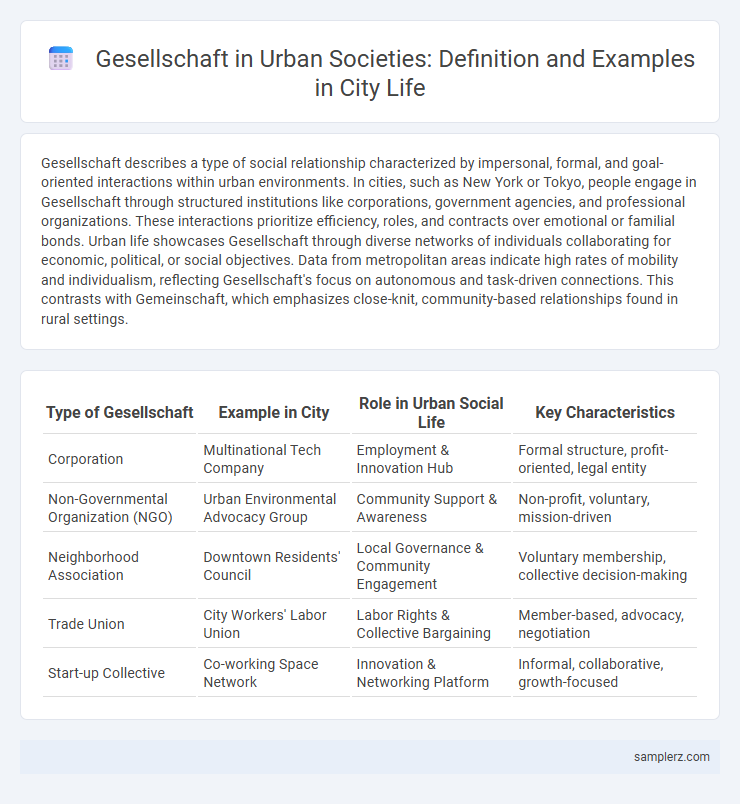Gesellschaft describes a type of social relationship characterized by impersonal, formal, and goal-oriented interactions within urban environments. In cities, such as New York or Tokyo, people engage in Gesellschaft through structured institutions like corporations, government agencies, and professional organizations. These interactions prioritize efficiency, roles, and contracts over emotional or familial bonds. Urban life showcases Gesellschaft through diverse networks of individuals collaborating for economic, political, or social objectives. Data from metropolitan areas indicate high rates of mobility and individualism, reflecting Gesellschaft's focus on autonomous and task-driven connections. This contrasts with Gemeinschaft, which emphasizes close-knit, community-based relationships found in rural settings.
Table of Comparison
| Type of Gesellschaft | Example in City | Role in Urban Social Life | Key Characteristics |
|---|---|---|---|
| Corporation | Multinational Tech Company | Employment & Innovation Hub | Formal structure, profit-oriented, legal entity |
| Non-Governmental Organization (NGO) | Urban Environmental Advocacy Group | Community Support & Awareness | Non-profit, voluntary, mission-driven |
| Neighborhood Association | Downtown Residents' Council | Local Governance & Community Engagement | Voluntary membership, collective decision-making |
| Trade Union | City Workers' Labor Union | Labor Rights & Collective Bargaining | Member-based, advocacy, negotiation |
| Start-up Collective | Co-working Space Network | Innovation & Networking Platform | Informal, collaborative, growth-focused |
Urban Networks: The Foundation of Gesellschaft in Modern Cities
Urban networks in modern cities serve as the backbone of Gesellschaft by facilitating complex social interactions through infrastructures like transportation systems, communication platforms, and public spaces. These interconnected networks enable diverse individuals and groups to collaborate economically and socially while maintaining individual autonomy. The efficiency of urban networks enhances social cohesion and functional differentiation, essential characteristics of Gesellschaft in contemporary urban environments.
Professional Relationships: Workplace Dynamics in Urban Environments
Professional relationships in urban Gesellschaft settings are characterized by formal roles, structured hierarchies, and goal-oriented interactions within diverse industries such as finance, technology, and healthcare. Workplace dynamics often involve collaboration across multicultural teams, emphasizing efficiency, productivity, and specialization in large metropolitan offices. These environments foster networking opportunities, career advancement, and socio-economic mobility, reflecting the impersonal yet strategic nature of Gesellschaft social bonds.
Public Transportation: Anonymous Interactions in City Life
Public transportation systems in cities foster anonymous interactions by enabling diverse individuals to share space without personal connections, reflecting the Gesellschaft concept of social organization based on formal roles and impersonal relationships. Commuters engage in brief, non-intimate encounters, relying on structured schedules and regulations rather than personal ties. This environment exemplifies urban social dynamics where functional cooperation takes precedence over emotional bonds.
Apartment Living: Neighbors as Acquaintances
Apartment living in urban Gesellschaft often shapes neighbors into acquaintances rather than close friends, fostering a social dynamic marked by polite nods and brief conversations. Shared spaces like hallways and laundry rooms facilitate occasional interactions but rarely lead to deeper community bonds. This reflects the modern urban tendency toward maintaining personal boundaries while coexisting in densely populated environments.
Economic Exchanges: Marketplace and Business Transactions
In urban Gesellschaft settings, economic exchanges are characterized by impersonal marketplace interactions and formal business transactions that prioritize efficiency and profit. These exchanges often involve contracts, negotiations, and monetary payments between individuals and organizations with limited personal relationships. The marketplace serves as a central hub where diverse economic activities, such as retail trade, service provision, and financial transactions, facilitate the city's economic growth and social complexity.
Social Organizations: Clubs and Associations in the Urban Space
Social organizations like clubs and associations play a crucial role in fostering Gemeinschaft within urban spaces by creating networks based on shared interests and cultural values. Urban clubs, ranging from sports teams to artistic groups, facilitate interpersonal connections and collective identity among diverse city dwellers. These organizations contribute to social cohesion by encouraging active participation and collaboration in community events and initiatives.
Civic Participation: Voting and Urban Governance
Civic participation in urban governance is exemplified by the active involvement of Gesellschaft members in city elections and public policy decision-making processes. Voter turnout rates in metropolitan areas often reflect diverse social groups engaging in shaping local government priorities. This collective engagement strengthens democratic institutions and promotes transparent urban management.
Digital Communities: Online Interactions Replacing Face-to-Face Ties
Digital communities in urban areas exemplify Gesellschaft by fostering interactions that prioritize individual goals over traditional social bonds. Online platforms enable city residents to connect for specific purposes, such as professional networking or interest-based groups, reducing reliance on face-to-face encounters. This shift highlights how urban Gesellschaft adapts through virtual spaces, emphasizing efficiency and functional relationships.
Volunteerism: Structured Community Service in Cities
Volunteerism represents a core aspect of Gesellschaft within urban environments, where structured community service operates through formal organizations and institutions. City residents participate in organized programs such as neighborhood clean-ups, food banks, and charity events, reflecting an impersonal yet coordinated social bond. This form of engagement promotes civic responsibility and reinforces social cohesion despite the large, heterogeneous nature of metropolitan populations.
Diversity and Multiculturalism: Coexistence without Close Bonds
In urban Gesellschaft settings, diverse populations coexist with minimal personal connections, emphasizing individual roles over communal ties. Multiculturalism thrives as people from varied backgrounds share public spaces and institutions, fostering tolerance yet maintaining social distance. This structure supports diversity by allowing multiple cultural identities to coexist independently within the city's social fabric.

example of Gesellschaft in city Infographic
 samplerz.com
samplerz.com